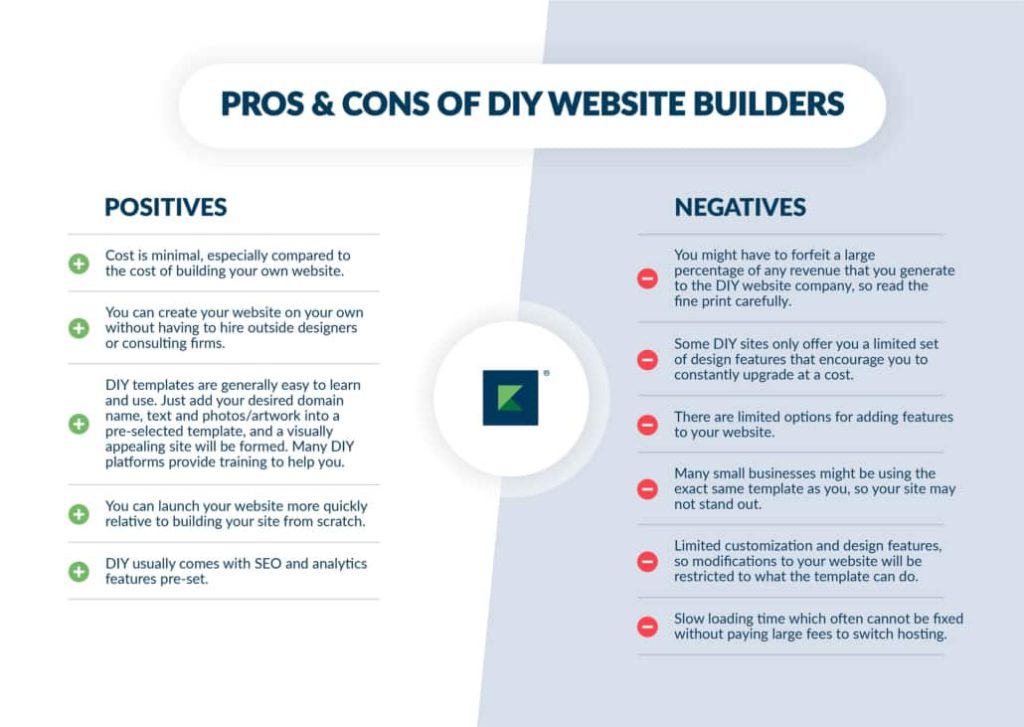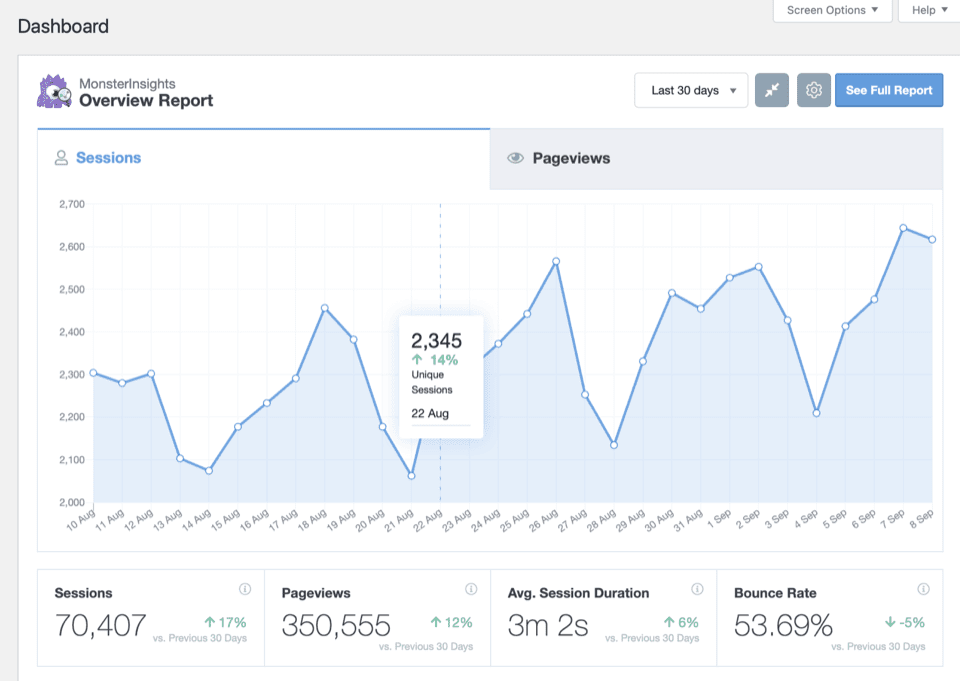DIY website builders are, to many, an easy and accessible way to develop their website and begin running their online business. However, like most services, there are always advantages and disadvantages to consider before enlisting the help of a DIY builder to set up your website. If you’re planning on running a small blog or starting a portfolio to help you showcase your work to land clients, chances are that website building sites are going to be a great tool for you to leverage for quick and easy website setup. On the other hand, those who plan on running a business with a host of moving parts and need a more professional look are going to benefit most by reaching out to developers with experience creating stellar websites.
That being said, some people may still opt for a DIY website builder as it might seem like a cheaper or faster option that they can do all on their own. If you’re looking to set up a professional website for your business and need more information on these platforms so you make the right choice for your website development, let’s take a look at the many disadvantages and costs of employing DIY platforms for your more complex website building needs.
The Financial Costs: Is DIY Worth It?
Setting up a website can be done on a budget, and that’s why many who want to start their own will turn to a DIY website builder. Wix, for example, might run anywhere from $23 to $64 for a custom website with more advanced features. However, they also offer free plans and cheaper options to help you get the basic results that you’re looking for. This can be quite attractive to individuals looking to launch their own small business who have a very limited budget and could benefit from the low-cost plans and features advertised by these kinds of website building sites.
As the website grows larger or requires greater functionality, this price only continues to rise. This makes DIY website builders even more attractive, but are they actually worth it?
A DIY builder seems like a great way to reduce costs, especially when there are typically a ton of free features to take advantage of. However, what many won’t tell you upfront is that there are plenty of downsides to a DIY builder that are lurking just beneath the surface of these services. Here are a few things to consider when you’re looking into DIY website builders for your small business.
- The biggest selling point for some DIY builders is the fact that they can get you started for free. However, free features aren’t necessarily good features. Often sticking to the free plan means not having your own website domain or being severely limited in what you’re able to do with your website as you’re only able to choose from a few free templates or plugins.
Let’s imagine, for example, that you’re looking for specific fonts or website design elements on your DIY website builder. If they don’t have what you want and you can’t remain consistent across all of your web pages (or your website looks cartoonish), you will either have to settle for the final product or pay more money to get the elements you need. This can be costly, regardless of whether you’re paying more for the necessary features and elements or you’re driving away users because your website doesn’t look and feel the way that modern users expect it to be when they click on your website.
- Should you wish to upgrade your website with your chosen DIY website builder, you might need to pay more to access the features that you need to get your website to look and feel how you envision it. This can be extremely costly, especially if you’re unsure of what you’re doing and end up spending more on features you don’t really need. Continuing with the above example of website building sites like Wix, Wix charges an annual subscription or a monthly subscription to allow you to tap into the various features you need to run a professional website.
This can cost anywhere from $23 to $64 per month or $192 to $708 per year. This is a lot of money to spend over time, even if it might seem like it’s worth it now. Additionally, your needs now might night reflect your needs later. You might start off only paying $16 a month and moving to $64 a month over the course of the next year. This can derail your budget and make it more difficult to operate your small business over time.
- There’s no telling what the future might look like. Will you need more storage? Will you need to migrate your website? Putting your site in the hands of a DIY website builder and paying for all the features you need to get established can end up costing you more in the long run.
Just a basic rundown of some of the costs you can expect to pay to get the most out of your website include owning your domain and keeping your information private (around $15/year and $10/year), buying Wix apps for your website (anywhere from $3 to $100 or more per app), upgrading to a new plan to upgrade your storage, and so much more.
Sure, a DIY website builder seems like a great resource to leverage if you’re a new business in need of a website. For some small businesses like simple blogs or those in need of a portfolio, this might be the case. However, those in need of professional, dynamic websites are going to end up paying far more to set up their website with building sites over time just to access the basic features they need to bring their vision to life. For this reason alone, it’s a much better decision to enlist the help of a developer and look for the services you need through platforms that can actually support your website over time without breaking the bank.
The Professional Costs of Setting Up a Website: How DIY Can Impact Your Business Endeavors

Source: Kapitus
Of course, DIY website costs aren’t only financial in nature. Making the decision to go with a DIY website builder can take a toll on your business as well. Here are some of the reasons why you might want to avoid a DIY builder instead of using it to create your website:
- Barriers to SEO: According to Ahrefs, approximately 90.63 percent of all the content on the web receives no traffic. Unfortunately, using a DIY builder might make you such a statistic. Website building sites won’t optimize your content for you. If you don’t have experience with SEO, this means setting up an entire website that isn’t visible to search engines and won’t be found by users making search queries relevant to your content and small business. On the other hand, reaching out to a developer that also offers related services such as SEO support can give you what you need to create a website that looks great and ranks.
- Limited Functionality and Poor Design: DIY website builders offer free plugins and design elements. However, as we’ve established above, these solutions may not look great or may limit you to only a few choices before you have to pay to get all of the elements you need. A lack of plugins and templates can only contribute to poor web design. Given that design and functionality play a role in whether or not people choose to stay on your website, this can be detrimental to your business.
- Technical Issues: From broken plugins to problems displaying on mobile, DIY websites are no strangers to technical issues. If you don’t have the experience to fix such issues or you’re not willing to outsource your needs (or your platform of choice simply doesn’t make it possible), you’re out of luck. There’s also the potential that the website builder you’re working with doesn’t offer the support needed to rectify these issues quickly and easily. Consider this when you’re researching website builders.

- Lack of Access to Essential Tools Such As Analytics: Website analytics and other tools needed to assess how your website is performing are critical to monitoring your progress and working towards growth. A free plan on a DIY website builder might not offer the right analytical tools you need, and a paid plan might cost too much for analytics that you could access for less.
Is Hiring a Developer or Agency Worth It?

Many people will avoid launching a website because of the amount of work that goes into it. A DIY website builder can seem like the perfect solution because it eliminates the work required to start a site. However, these website building sites don’t necessarily make things easier. If you truly want results, you have to invest both time and money. You need to learn how to navigate the builder, work on developing stunning pages and the layout of the site, consistently update things, tackle technical issues, and more. In all this, you might find yourself losing out on personal and professional opportunities because your DIY website is taking up so much of your time!
So, is hiring a professional website development agency or individual developer worth it instead of a DIY website builder? It is! Some of the benefits of enlisting the help of a professional instead of trying to tackle it yourself on a website builder include:
- Working with someone who understands responsive site design, how to take your vision and create a working website, and what goes into development to create a site that functions optimally and meets users’ needs.
- Spending significantly less as you’re only paying for the project rather than continuing to pay significant monthly subscription fees in order to use your DIY website builder.
- Having access to related services that you might need. For example, if you choose to enlist the help of an agency to work with you on creating your website, they can also provide you with support for SEO, which is crucial if you want to be visible on search engines.
- Spending less time trying to troubleshoot issues with your website or creating a website that doesn’t meet your business’s standards. The reality is that using a DIY website builder can be time-consuming, and you could be spending that time better working on other areas of your business that benefit from your expertise.
- Getting a polished finished product that’s faster and works on mobile to help you reach more users and retain those who land on your website.
- And beyond…
Working with a developer can seem like a major investment, especially when you see the numbers that are associated with the type of website development that you need support with. But while DIY website numbers can seem enticing, they’re rarely worth the headache as you spend more and more time and money to deal with the issues that arise. Put simply, if you’re in need of a website for a small business that requires something more professional than a basic blog or portfolio, you’re going to want a developer or agency on your side, not website building sites.
Make the Right Choices and Do Your Due Diligence Before You Launch Your Site!
Starting a website is a major step for your small business, and it’s one that shouldn’t be taken lightly. Making the decision to go with a DIY website builder instead of a professional developer or agency can cost you greatly down the road. The guide above illustrates why you might choose the latter if you’re a business in need of something a bit more than basic builders can provide you. The good news? There are plenty of web design services companies that can help you get started! Take the first step by reaching out to one of them today.

